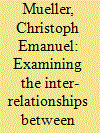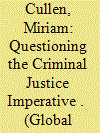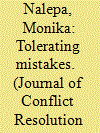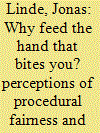|
|
|
Sort Order |
|
|
|
Items / Page
|
|
|
|
|
|
|
| Srl | Item |
| 1 |
ID:
175030


|
|
|
|
|
| Summary/Abstract |
This study contributes to the literature by examining the effects of four particular determinants of public attitudes towards power grid expansion projects, namely residents' perceived procedural fairness, their trust in actors involved in the planning procedure, their risk expectations, and their perceived benefits. By accessing data collected from residents living along and in the wider area of a controversially discussed grid expansion project in Germany, a theoretically derived path model was tested empirically by means of structural equation modeling. The findings revealed that perceived procedural fairness directly affected residents’ trust in actors and indirectly influenced their risk expectations, their perceived benefits, and attitudes. Trust exerted a significant influence on risk expectations, perceived benefits, and attitudes, whereas risk expectations and perceived benefits significantly affected attitudes. Overall, the findings provide novel insights into specific mechanisms that shape public attitudes towards the construction of new HVTLs and suggest that it is crucial for the competent planning authorities and transmission system operators to provide fair information and participation measures and establish a trustworthy relationship to local residents affected by the infrastructure project.
|
|
|
|
|
|
|
|
|
|
|
|
|
|
|
|
| 2 |
ID:
149936


|
|
|
|
|
| Summary/Abstract |
Growing awareness of the potential for some energy-related activities to induce earthquakes has created a need to understand how the public evaluates the risks of induced earthquakes versus the benefits of energy development. To address this need, this study presents a web survey that used a between-subjects factorial experimental design to explore the views of 325 U.S. adults, who were asked about their experiences with earthquakes; risk perceptions related to different causes of earthquakes (e.g., natural versus induced); and acceptability of earthquakes depending on the benefits, beneficiaries, and decision making process. The results found that participants had more negative feelings toward induced versus naturally occurring earthquakes. Although they judged no earthquake as “acceptable,” participants rated induced earthquakes significantly less acceptable than naturally occurring ones. Attributing the benefits to the provision of renewable energy or climate change mitigation did not increase induced earthquake acceptability, and no particular beneficiary made earthquakes more acceptable, although private companies as beneficiaries made earthquakes less acceptable. Finally, induced earthquake acceptability was significantly higher when people believed that people like them had a voice in the decision to implement the technology that caused the earthquake, underscoring the importance of public engagement in the development of energy technologies.
|
|
|
|
|
|
|
|
|
|
|
|
|
|
|
|
| 3 |
ID:
165920


|
|
|
|
|
| Summary/Abstract |
The Security Council’s structure as a small but powerful executive, combined with its primary responsibility for international peace and security, leads to a presumption against the application of ordinary standards of procedural fairness. At the same time, explicit provisions of the UN Charter and its own rules of procedure indicate that some balance was to be struck. This article questions whether the attainment of international criminal jurisdiction through Security Council decision-making really outweighs the need to ensure procedural integrity in every step of the process. It posits that a lack of procedural fairness in the Council’s methods of work at least undermines the justice imperative that the Council so espouses and at most violates an ancillary legal obligation.
|
|
|
|
|
|
|
|
|
|
|
|
|
|
|
|
| 4 |
ID:
113756


|
|
|
|
|
| Publication |
2012.
|
| Summary/Abstract |
How do perceptions of procedural fairness shape the preferences that citizens have for transitional justice (TJ) in postauthoritarian countries? This article uses original opinion poll data collected in Poland, Hungary, and the Czech Republic to investigate this question. It shows that differences in the demand for TJ are explained by how citizens perceive whether the TJ process commits errors-that is, whether the innocent are condemned (falsely convicted) or the guilty are exonerated (falsely acquitted). This is so even after accounting for threat perceptions of former autocrats and voting behavior. After comparing the ways in which citizens' perceptions of errors in the TJ process shape their demand for lustration in the three postcommunist countries, the author discusses the implications of these findings for scholars of democratic consolidation, social psychologists, and policy makers designing TJ systems.
|
|
|
|
|
|
|
|
|
|
|
|
|
|
|
|
| 5 |
ID:
118531


|
|
|
|
|
| Publication |
2012.
|
| Summary/Abstract |
How can democracies satisfy citizens' demands for legitimate decision making? This article reports findings from a randomised field experiment designed to mimic decision making in large-scale democracies. Natural collectives of individuals with a shared history and future (high school classes) were studied. They were asked to make a decision about how to spend a sum of money under arrangements imposed by the researchers and distributed randomly across classes. Within this setting, empirical support for three ideas about legitimacy enhancing decision-making arrangements is tested: participatory constitution-making; personal involvement in the decision-making process; and fairness in the implementation of arrangements. Throughout the analyses it was found that personal involvement is the main factor generating legitimacy beliefs.
|
|
|
|
|
|
|
|
|
|
|
|
|
|
|
|
| 6 |
ID:
111908


|
|
|
|
|
| Publication |
2012.
|
| Summary/Abstract |
There is widespread agreement that bad governance and corruption represent daunting threats to new democracies and developing countries. Nonetheless, mainstream research on system support and political legitimacy has to a large extent overlooked the crucial importance of public perceptions of procedural fairness for fostering public support and regime legitimacy. Taking its departure in the theory of procedural fairness, this article challenges the conventional wisdom of earlier research by arguing and demonstrating that public perceptions of procedural fairness and impartiality on behalf of the authorities are the most important determinants of system support in the post-communist European Union Member States. The empirical analysis lends strong support to the fact that perceptions of fairness and the extent of corruption exercise a strong effect on public support for the performance of the political system and approval of regime principles.
|
|
|
|
|
|
|
|
|
|
|
|
|
|
|
|
|
|
|
|
|